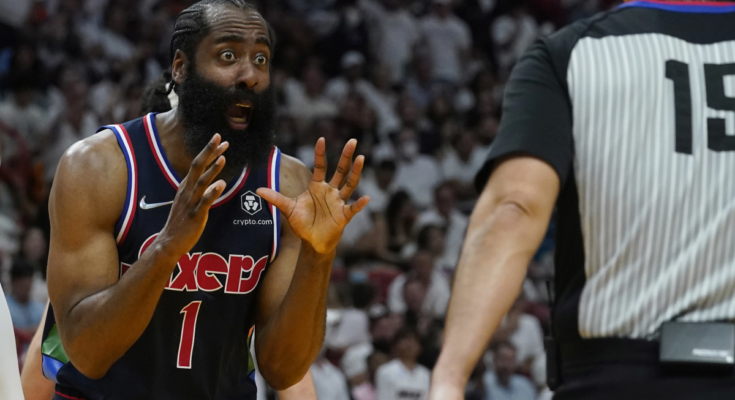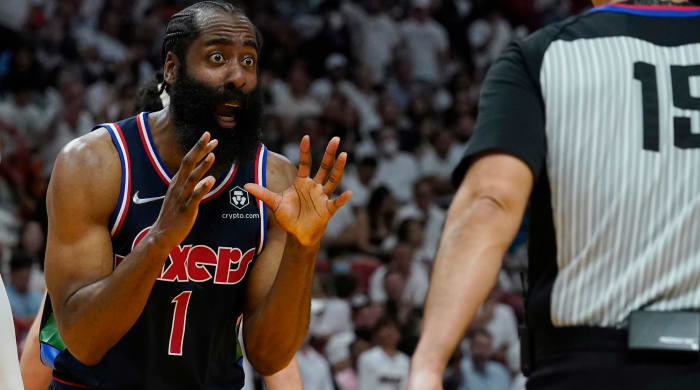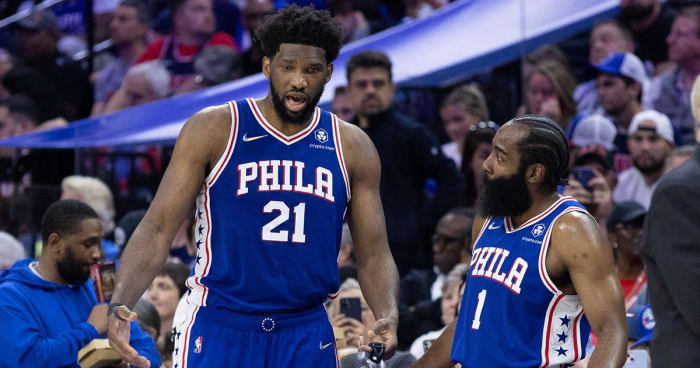Early in the fourth quarter of Game 6 between the Sixers and Heat, an exhausted Doc Rivers abandoned attempts to scheme his team back into it and appealed directly to its competitive spirit. “Fight for this,” implored Rivers. “Come on guys, fight for this.” They didn’t. Miami’s lead swelled to 19, then to 20 before Philadelphia closed the gap in garbage time, ending the game—and its season—with a 99–90 defeat.
In the moment, Rivers was addressing everyone in that Sixers huddle. His message, however, was likely aimed squarely at James Harden. In the biggest game of Philadelphia’s season, Harden played like he didn’t want to be there. He attempted nine shots, fewer than anyone in the Sixers starting lineup but Danny Green—who left the game after three minutes with a knee injury. In the third quarter Harden had more turnovers (two) than shots. He attempted one more in the fourth quarter. He didn’t attempt a free throw. His final line: 43 minutes, 11 points, nine assists, four turnovers.
“We never got any offensive rhythm tonight,” Rivers said. “I didn’t like how we played … I thought we had more.”
And Harden?
“‘Listen,” said Rivers. “I don’t want to make this a referendum on James.”
Fine. But how Philadelphia deals with Harden this summer will define the future of the franchise. The Sixers mortgaged the future to acquire Harden. They traded Ben Simmons, their most appealing trade chip. They included Seth Curry, a 31-year old sharp shooting guard who Joel Embiid really liked playing with. They threw in a pair of first round picks. Team president Daryl Morey believed Harden was the missing piece, and he hitched Philadelphia’s wagon to him.
And now the 76ers’ front office has a decision to make on what to pay him.
When Philadelphia traded for Harden in February the expectation was that the Sixers would lock Harden in on a five-year contract worth north of $250 million. Morey’s affection for Harden is well known. He acquired Harden from Oklahoma City in 2012, empowered him and watched him blossom into an MVP. Morey has routinely referred to Harden as the greatest isolation player in NBA history and believed the chance to play with a dominant scoring big like Embiid—the type of player Morey and Harden talked about but were never able to bring to Houston—would energize him.
It didn’t. Harden averaged 21 points per game during the regular season. His field goal percentage (40.2%) and three-point percentage (32.6%) were career lows. His numbers in the playoffs were comparable. For every brilliant game Harden played (a 22-point, 15-assist effort in Game 6 against Toronto, a 31-point outburst in Game 4 against Miami) there were twice as many clunkers. In Philly’s last two games, Harden attempted 22 shots, scored 25 points and had nearly as many turnovers (eight) as assists (13). While ex-Sixer Jimmy Butler carried his team—“I still don’t know why we let him go,” said a still-salty Embiid—Harden was little more than a bystander on his.
Asked to explain his lack of aggressiveness in Game 6, Harden said, “When we were on offense, the ball just didn’t get back to me.”
It’s not that simple. Embiid knows it. “Everybody expected the Houston James Harden,” Embiid said. “That’s not who he is anymore. He’s more of a playmaker.” Harden knows it. The rest of the NBA knows it. “The decline is evident,” a rival team executive told SI. “You can see it in his ability to create space, to create the shots he would usually generate. He doesn’t have the burst. People aren’t scared of him driving and scoring. They are challenging that step back more frequently. He’s just not the same player.”
Scroll to Continue
He’s not, but Harden, who will turn 33 this summer, enters the offseason with leverage. He has until June 29 to opt into the final year of his contract, a decision that would guarantee him $47.4 million next season. He could bet on himself, that a healthy summer and a full training camp with Embiid, Tyrese Maxey and Matisse Thybulle will lead to a more productive season. It’s a risk—Harden’s hamstring issues have become chronic, and he could get hurt or his regression could continue—but it’s a stick he could use in negotiations.
Because what is Philadelphia going to do? Allowing Harden to opt in and play out his contract makes some business sense. But Harden has effectively quit on two teams when he didn’t like what was happening. Philadelphia, desperate to maximize the MVP-level seasons of Embiid, doesn’t want to be a third.
And what if Harden finds a better deal? He’s got six weeks to survey the landscape—spare me the tampering outcry, unless you are among those who think deals agreed to a minute into free agency are negotiated in the 60 seconds after it opens—and see what’s out there. The marketplace won’t be robust. But what if Houston, home to Harden’s most successful seasons, seeks a reunion? What if Portland, desperate to add more star power alongside Damian Lillard, opens the vault?
Can Philadelphia risk losing Harden for nothing?
For his part, Harden said he intends to be with the Sixers next season. Asked directly if he would opt into the final year of his contract, Harden said, “I’ll be here. Whatever allows this team to grow and get better and do the things necessary to win and compete at the highest level.” Asked if he would take less than the max to do it, Harden said, “Whatever it takes to help this team grow and put us up there with the best of them.”
Morey bet big on Harden. Now he must figure out how to make it work with him. There is an obvious contractual middle ground. Chris Paul’s deal last summer, for example. Paul signed a new four-year, $120 million deal, while giving Phoenix financial flexibility. The Sixers undoubtedly would love to work out a similar deal with Harden. The question is if Harden will go for it.
“This is going to define Daryl,” said the exec. “The trade has not worked out the way he had hoped. If he messes this up and James leaves, where does that leave them? If he overpays him, how do they build a winner? He knew James better than anybody. He knew his lifestyle, he knew where his body was at. He had to have some level of knowledge about where this was going. He loves the guy. He’s loyal to the guy. I get that. But you have to separate from that when making these decisions.”
A significant offseason is coming. Embiid—who battled through a torn ligament in his thumb, a broken bone in his face and a concussion in this series—will require at least one surgery. Maybe two. Rivers could be replaced. Tobias Harris could be shopped. “[The front office] is going to do what it takes to win a championship,” Embiid said. “If it means trading people, signing new people, or trading me, that’s what they’re going to do.”
No decision, though, looms larger than the future of Harden. The right outcome could push the Sixers into the title picture. The wrong one could ruin them.
More NBA Coverage:




